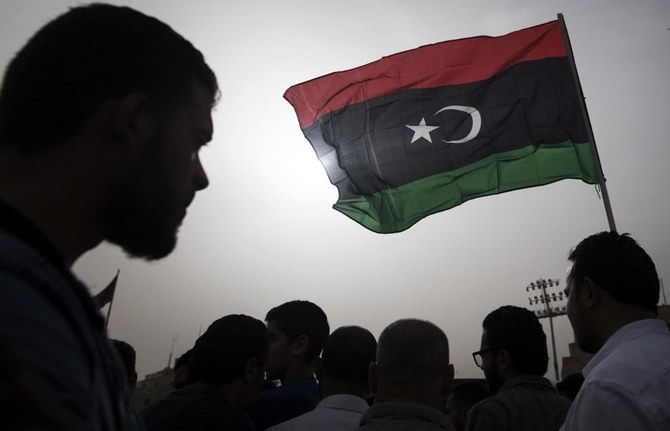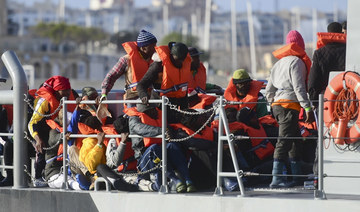TRIPOLI: Peering through the gate of a home in the western suburbs of Libya’s war-torn capital, seven-year-old Chehab shyly looked on as children streamed down the nearby street.
“I’ll just play by myself,” he muttered, holding a ball under one arm.
“I don’t know anyone in this neighborhood.”
He is one of the more than 60,000 civilians who have fled their homes in Tripoli since early April, when forces loyal to commander Khalifa Haftar began their push to take the capital.
While some have found refuge at shelters throughout the city, many more have instead turned to relatives and even mere acquaintances as Libyans band together to find homes for the displaced.
Chehab and his family arrived at his uncle’s home in Janzur in mid-April after fleeing the southern suburb of Ain Zara as it turned into a front-line battlefield.
Nearly a month later, his 10-year-old sister Alia misses the comforts of home.
“I want to go home and go back to school,” she sighed.
“The school closed again because of the war and I had to leave my friends, my room and my toys.”
Their father Abdelhafid would have liked to find a furnished apartment for the family to rent for the holy month of Ramadan, but it proved too expensive.
“I don’t know what I would have done if my brother hadn’t opened his door,” the high school geography teacher said.
An initial lightning advance by Haftar’s forces on April 4 was quickly bogged down by militias loyal to the UN-recognized unity government — which is based in Tripoli — as they rushed to defend the capital.
The fighting has killed 454 people and wounded more than 2,000 others, according to the World Health Organization.
The European Union warned Monday that Haftar’s offensive on the capital was a threat to international peace.
But front lines have since largely frozen and the intensity of the fighting has dipped with the beginning of Ramadan.
The clashes are centered along the capital’s southern gates, particularly in Ain Zara.
But the fighting also extends elsewhere, including the districts of Salaheddin and Khalat Al-Ferjan, as well as Tripoli’s international airport which was destroyed in 2014 fighting.
“Our main concern is with civilians living near the front lines,” said Youness Rahoui, head of the International Committee of the Red Cross in Tripoli.
“Densely populated neighborhoods are gradually becoming battlefields.”
Habiba left her home near the airport in a hurry after neighbors told her they were fleeing the area.
For her, finding room with relatives or at a shelter were not options.
But her husband’s friends came to the rescue, securing the family an apartment in the western neighborhood of Siyahia that had once been used as an office by a foreign company.
The family sleeps on mattresses nestled between a clutter of desks and chairs, but Habiba still believes they are “lucky.”
“Our loved ones often don’t have the space or the means to welcome an entire family,” she said, adding she hoped to join her husband who lives abroad.
“The school year is ruined anyway,” she said, hinting that taking her children along for the journey would not affect their studies.
Classes have been suspended across the capital, and schools in several districts have been transformed into makeshift shelters for the displaced.
Many homes in the southern suburbs have been damaged or completely destroyed by the fighting.
Gasr Ben Ghachir, one of the heaviest hit areas, lies almost completely abandoned.
But 29-year-old Hamza has stayed behind to “stand guard” against looters, while his family takes refuge with relatives.
He doesn’t “feel comfortable staying at other people’s homes,” he told AFP by phone.
But he will need a break from guard duty in a few days, when his supplies run out.
“The past few weeks have been tough and I need a rest,” he said.
Libyans band together to help Tripoli’s displaced
Libyans band together to help Tripoli’s displaced

- More than 60,000 civilians were displaced from their homes in Tripoli
- World Health Organization said the fighting in Tripoli killed more than 450 people
Lebanon hopes for neighborly relations in first message to new Syria government

- Lebanon’s Iran-backed Hezbollah played a major part propping up Syria’s ousted President Bashar Assad through years of war
- Syria’s new Islamist de-facto leader Ahmed Al-Sharaa is seeking to establish relations with Arab and Western leaders
DUBAI: Lebanon said on Thursday it was looking forward to having the best neighborly relations with Syria, in its first official message to the new administration in Damascus.
Lebanese Foreign Minister Abdallah Bou Habib passed the message to his Syrian counterpart, Asaad Hassan Al-Shibani, in a phone call, the Lebanese Foreign Ministry said on X.
Lebanon’s Iran-backed Hezbollah played a major part propping up Syria’s ousted President Bashar Assad through years of war, before bringing its fighters back to Lebanon over the last year to fight in a bruising war with Israel – a redeployment which weakened Syrian government lines.
Under Assad, Hezbollah used Syria to bring in weapons and other military equipment from Iran, through Iraq and Syria and into Lebanon. But on Dec. 6, anti-Assad fighters seized the border with Iraq and cut off that route, and two days later, Islamist militants captured the capital Damascus.
Syria’s new Islamist de-facto leader Ahmed Al-Sharaa is seeking to establish relations with Arab and Western leaders after toppling Assad.
Iraqi intelligence chief discusses border security with new Syrian administration

BAGHDAD: An Iraqi delegation met with Syria’s new rulers in Damascus on Thursday, an Iraqi government spokesman said, the latest diplomatic outreach more than two weeks after the fall of Bashar Assad’s rule.
The delegation, led by Iraqi intelligence chief Hamid Al-Shatri, “met with the new Syrian administration,” government spokesman Bassem Al-Awadi told state media, adding that the parties discussed “the developments in the Syrian arena, and security and stability needs on the two countries’ shared border.”
Israeli minister’s Al-Aqsa mosque visit sparks condemnation

- Ben Gvir has repeatedly defied the Israeli government’s longstanding ban on Jewish prayer at the site in Israeli-annexed east Jerusalem
JERUSALEM: Israel’s National Security Minister Itamar Ben Gvir visited Jerusalem’s Al-Aqsa mosque compound on Thursday, triggering angry reactions from the Palestinian Authority and Jordan accusing the far-right politician of a deliberate provocation.
Ben Gvir has repeatedly defied the Israeli government’s longstanding ban on Jewish prayer at the site in Israeli-annexed east Jerusalem, which is revered by both Muslims and Jews and has been a focal point of tensions in the Israeli-Palestinian conflict.
“I went up to the site of our temple this morning to pray for the peace of our soldiers, the swift return of all hostages and a total victory, God willing,” Ben Gvir said in a message on social media platform X, referring to the Gaza war and the dozens of Israeli captives held in the Palestinian territory.
He also posted a photo of himself on the holy site, with members of the Israeli security forces and the famed golden Dome of the Rock in the background.
The Al-Aqsa compound in Jerusalem’s Old City is Islam’s third-holiest site and a symbol of Palestinian national identity.
Known to Jews as the Temple Mount, it is also Judaism’s holiest place, revered as the site of the second temple destroyed by the Romans in 70 AD.
Under the status quo maintained by Israel, which has occupied east Jerusalem and its Old City since 1967, Jews and other non-Muslims are allowed to visit the compound during specified hours, but they are not permitted to pray there or display religious symbols.
Palestinians claim east Jerusalem as their future capital, while Israeli leaders have insisted that the entire city is their “undivided” capital.
The Palestinian Authority’s foreign ministry said in a statement that it “condemns” Ben Gvir’s latest visit, calling his prayer at the site a “provocation to millions of Palestinians and Muslims.”
Jordan, which administers the mosque compound, similarly condemned what its foreign ministry called Ben Gvir’s “provocative and unacceptable” actions.
The ministry’s statement decried a “violation of the historical and legal status quo.”
The office of Israeli Prime Minister Benjamin Netanyahu said in a brief statement that “the status quo on the Temple Mount has not changed.”
UN force sounds alarm over Israeli ‘destruction’ in south Lebanon

- Under the ceasefire agreement, UNIFIL peacekeepers and the Lebanese army were to redeploy in south Lebanon, near the Israeli border, as Israeli forces withdrew over 60 days
BEIRUT: The United Nations’ peacekeeping force in Lebanon expressed concern on Thursday at the “continuing” damage done by Israeli forces in the country’s south despite a ceasefire in the war with Hezbollah.
The truce went into effect on November 27, about two months after Israel stepped up its bombing campaign and later sent troops into Lebanon following nearly a year of exchanges of cross-border fire initiated by Hezbollah over the war in Gaza.
The warring sides have since traded accusations of violating the truce.
Under the ceasefire agreement, UNIFIL peacekeepers and the Lebanese army were to redeploy in south Lebanon, near the Israeli border, as Israeli forces withdrew over 60 days.
UNIFIL said in a statement on Thursday that “there is concern at continuing destruction by the IDF (army) in residential areas, agricultural land and road networks in south Lebanon.”
The statement added that “this is in violation of Resolution 1701,” which was adopted by the UN Security Council and ended the last Israel-Hezbollah war of 2006.
The UN force also reiterated its call for “the timely withdrawal” of Israeli troops from Lebanon, and “the full implementation of Resolution 1701.”
The resolution states that Lebanese troops and UN peacekeepers should be the only forces in south Lebanon, where Hezbollah exerts control, and also calls for Israeli troops to withdraw from Lebanese territory.
“Any actions that risk the fragile cessation of hostilities must cease,” UNIFIL said.
On Monday the force had urged “accelerated progress” in the Israeli military’s withdrawal.
Lebanon’s official National News Agency (NNA) reported on Thursday “extensive” operations by Israeli forces in the south.
It said residents of Qantara fled to a nearby village “following an incursion by Israeli enemy forces into their town.”
On Wednesday the NNA said Israeli aircraft struck the eastern Baalbek region, far from the border.
Syria forces carry out operation against pro-Assad ‘militias’: state media

- Operation had already succeeded in ‘neutralizing a certain number’ of armed men loyal to Assad
DUBAI: The new Syrian military administration announced on Thursday that it was launching a security operation in Tartous province, according to the Syrian state news agency.
The operation aims to maintain security in the region and target remnants of the Assad regime still operating in the area.
The announcement marks a significant move by the new administration as it consolidates its authority in the coastal province.
The operation had already succeeded in “neutralizing a certain number” of armed men loyal to toppled president Bashar Assad, state news agency SANA reported said.
The Syrian Observatory for Human Rights monitor has reported several arrests in connection with Wednesday’s clashes.
Further details about the scope or duration of the operation have not yet been disclosed.




















